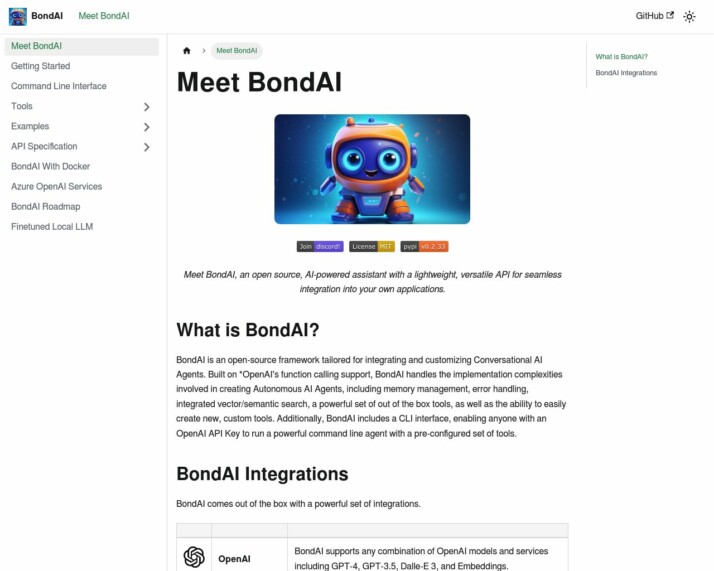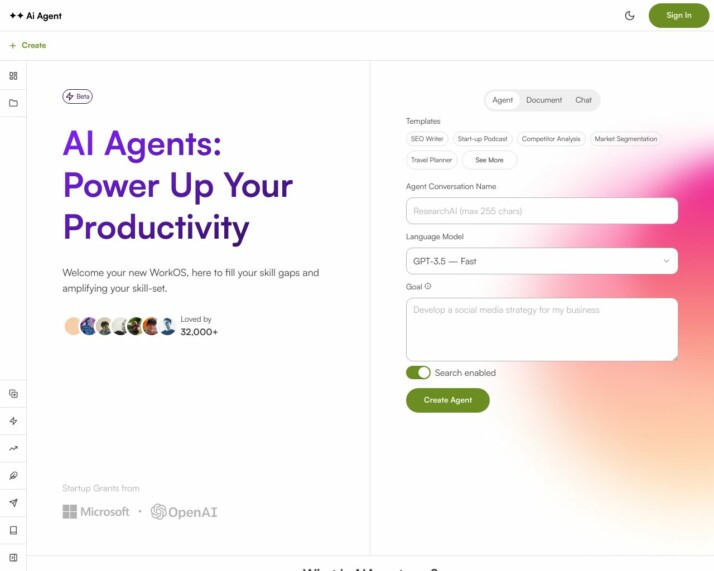Table of Contents
Introduction
Are you looking to integrate and customize Conversational AI Agents? If so, you might be interested in comparing BondAI and AI Agent. Let’s explore the features and applications of both platforms.
BondAI caters to a range of users, including developers, engineers, businesses, and enterprises. With its flexibility, comprehensive API, and array of tools, BondAI is particularly geared towards developers who want to create custom AI-driven applications. It offers easy integration with OpenAI’s models and services, making it an attractive option for leveraging advanced AI capabilities in projects.
For businesses and enterprises, BondAI provides useful offerings to enhance customer interaction, automate processes, and integrate AI into existing systems. The framework’s scalability and integration with cloud services like Azure OpenAI Services make it suitable for businesses of various sizes, especially those that require robust AI solutions.
If you’re an innovator in Conversational AI, focused on building conversational agents such as chatbots for customer service or personal assistants, BondAI aligns well with your needs. The framework emphasizes easing the creation and customization of these agents, providing a toolset that caters to this group.
BondAI also offers tools and integrations for tech-enabled service providers in sectors like finance, healthcare, or customer support. These tools, like stock/cryptotrading, email reading, and semantic search, can enhance service offerings and operations.
In summary, BondAI caters to a technically adept audience, primarily developers and businesses, who are looking to harness the power of AI for creating sophisticated conversational agents and integrating AI into various applications and services. Its ease of use, scalability, and robust toolset make it appealing for those aiming to innovate or improve efficiency through AI.
AI Agent, on the other hand, offers a no-code platform focused on building AI agents with an emphasis on ease of use and versatility. They provide autonomous agents and problem-solving capabilities. However, there is no explicit mention of explainability and transparency features in AI Agent’s documentation.
It’s important to note that BondAI supports various OpenAI models and services, including GPT-4 and GPT-3.5, and offers a framework for creating custom tools. AI Agent seems to prioritize making AI integration and the development of AI agents more accessible and efficient, offering a flexible and scalable platform.
Now that we have a brief introduction to BondAI and AI Agent, let’s dive deeper into their features and compare them side by side.
A Comprehensive Overview of BondAI
For an audience of developers and organizations, the promising world of AI technology unfolds significantly with BondAI. With a suite of unique offerings, this AI platform carves out a niche for itself within the buzzing AI industry.


One of the robust attributes of BondAI is its knack for appealing to a wide variety of users. It offers a comprehensive API and a host of developer tools, which primarily caters to engineers and developers aspiring to create custom AI-driven applications. It marvelously integrates with OpenAI’s models and services for advanced AI capabilities.
Next comes businesses and enterprises that eye enhanced customer interaction, streamlined processes, and AI integration into their existing systems. BondAI proves beneficial with its scalability and integration with cloud services like Azure Open AI Services. This makes it a suitable choice for businesses of various sizes, predominantly those requiring robust AI solutions.
Moreover, innovators in Conversational AI find BondAI’s offerings a great resource. For creating chatbots for customer service, personal assistants, and other interactive AI applications, BondAI aligns well. The focus on easiness in creation and customization of these agents is an added advantage.
BondAI is also favorable for tech-enabled service providers such as sectors like finance, healthcare, or customer support. It offers several tool integrations including stock/cryptotrading, email reading, and semantic search.
The vision of BondAI is centered on making AI integration and the development of AI agents more accessible and efficient. With a flexible and scalable platform, BondAI aims to streamline the development process of AI-driven applications and services. Overall, BondAI aims at harnessing the power of AI for creating sophisticated conversational agents and integrating AI into various applications and services.
Delving into the AI Agent: A Comprehensive Overview
The AI Agent has made a name for itself with its impressive features, advanced capabilities, and a well-defined target audience. But what makes this product truly unique is its ambitious vision and the recent, cutting-edge developments.


Using AI, or Artificial Intelligence, the AI Agent offers cloud-based services to its users. This model means users pay for their hosting services, much like a subscription. What makes it stand out is its uniqueness. The AI agents can work by themselves, manage tasks, and make decisions. This especially helps businesses by automating routine tasks and speeding up decision-making.
Another significant feature is the AI Agent’s focus on easy communication between humans and AI. With user-friendly interfaces, users can interact effectively with AI. Moreover, the AI Agent uses Large Language Models (LLM), like GPT-4, showing a commitment to advanced technology.
The AI Agent is also secure and reliable in its live operations. The agents can solve complex tasks, ranging from market analysis to crafting content, showing a wide range of possibilities. The vision they’ve shipped reflects an aim to enhance business processes through automation and efficient human-AI interaction.
The AI Agent seeks to cater to those with technical expertise, particularly in software development and AI technologies. This includes AI researchers, enthusiasts, IT professionals, businesses, organizations, and data scientists. It’s a versatile tool that meets the demand for a technically adept audience looking to develop, deploy, and manage advanced AI assistants and applications.
Comparing Features: BondAI vs AI Agent vs SmythOS
In the space of Large Language Models (LLMs) such as BondAI and AI Agent, each platform has its own unique features, some of which are common, while others differentiate them from their competitors. It is essential to clear up these differences and understand what each system can offer to make the best choice for your specific needs.
This comparison will touch on important features including, but not limited to, hosting agents, code editing options, memory & context functionality, autonomous agent support, and problem-solving capabilities.
Comparison Table
| Features | BondAI | AI Agent | SmythOS |
| Hosted Agents (Dev, Production) | ❌ | ✅ | ✅ |
| Environments (Dev, Production) | ✅ | ✅ | ✅ |
| Visual Builder | ❌ | ❌ | ✅ |
| No-Code Editor | ❌ | ❌ | ✅ |
| Memory & Context | ✅ | ✅ | ✅ |
| Autonomous Agents | ✅ | ✅ | ✅ |
| Explainability and Transparency | ❌ | ✅ | ✅ |
| Debug Mode | ❌ | ❌ | ✅ |
| Problem-Solving Capabilities | ✅ | ✅ | ✅ |
How do these differences matter? To start with, if you’re looking for a user-friendly, no-code platform, your best bet would be SmythOS. Hosted environments are also an important feature to consider – while BondAI lacks hosted agents, both AI Agent and SmythOS excel in this area.
Explainability and transparency, lacking in BondAI, are present in AI Agent and SmythOS – this could be crucial for those who want clarity on how the models make decisions.
Ultimately, the choice between BondAI, AI Agent, or SmythOS might come down to your specific needs, priorities, and comfort level.
BondAI And AI Agent: A Detailed Audience Analysis
In this section, we will delve into the target audience of both BondAI and AI Agent, highlighting the type of users that each platform generally attracts. We aim to understand the needs and preferences of the users of both tools.
BondAI Audience
BondAI caters to a technically adept audience, primarily developers and businesses, who are looking to harness the power of AI for creating sophisticated conversational agents and integrating AI into various applications and services.
The platform’s flexibility, comprehensive API, and array of tools make it particularly geared towards developers who want to create custom AI-driven applications. The ease of integration with OpenAI’s models and services makes it an attractive option for those looking to leverage advanced AI capabilities in their projects.
For businesses and enterprises seeking to enhance their customer interaction, automate processes, or integrate AI into their existing systems, BondAI’s offerings are useful. The framework’s scalability and integration with cloud services like Azure Open AI Services make it suitable for businesses of various sizes, especially those that require robust AI solutions.
Companies and individuals focused on building conversational agents, such as chatbots for customer service, personal assistants, or other interactive AI applications, are a key audience. BondAI’s emphasis on easing the creation and customization of these agents aligns well with the needs of this group.
For service providers in sectors like finance, healthcare, or customer support who are looking to incorporate AI into their services, BondAI offers tools and integrations that can enhance their offerings and operations. Stock and crypto trading, email reading, and semantic search are some of the integrations provided.
AI Agent Users
AI Agent is designed for technically adept users who are involved in AI research or enthusiastic about exploring AI technologies. It caters to AI researchers and enthusiasts looking to create AI assistants using language models like GPT-3.5 and GPT-4.
IT and systems administrators who require a robust and efficient environment for running and managing agents can benefit from AI Agent’s Superagent Cloud Platform. Its ability to handle complex workflows and provide meaningful interactions through AI assistants makes it a valuable tool for businesses and organizations looking to leverage AI for various applications, such as customer service, data analysis, or automated task handling.
Data scientists and analysts will find AI Agent suitable for their needs. It offers features for preprocessing and postprocessing data, interaction through Python notebooks, and integration of tools for data analysis.
User Behavior and Preferences
Both BondAI and AI Agent aim to provide convenient and customizable platforms for their users. While BondAI emphasizes the creation and customization of conversational AI agents, AI Agent focuses on using advanced AI models for natural language processing and generation.
BondAI’s users benefit from its rich toolset and API flexibility, which includes functionalities for internet searches, market trading, email interactions, and more. The platform also mentions memory management as one of its features, implying the ability to remember past interactions and use context. Users can create autonomous agents capable of performing tasks without direct user prompts.
On the other hand, AI Agent leverages foundational AI models like GPT-3.5 and GPT-4, enabling sophisticated natural language processing and generation capabilities. The framework also offers features like the Superagent Cloud Platform for running and managing agents, making it particularly relevant for IT professionals and systems administrators.
While both platforms cater to technically adept users, their focus and capabilities differ. BondAI targets developers and businesses looking to create sophisticated conversational agents and integrate AI into applications and services. AI Agent caters to AI researchers, enthusiasts, IT professionals, and data scientists interested in exploring advanced AI models and developing AI assistants.
With their own unique strengths, both BondAI and AI Agent provide valuable tools for their respective audiences. Ultimately, it is important for users to assess their specific needs and preferences when choosing the platform that best suits their requirements.
Conclusion: BondAI vs AI Agent
After comparing the two popular AI platforms, BondAI and AI Agent, we have reached our final thoughts.
BondAI: BondAI caters to a technically adept audience, primarily developers and businesses, who are looking to harness the power of AI for creating sophisticated conversational agents and integrating AI into various applications and services. Its ease of use, scalability, and robust toolset make it appealing to those aiming to innovate or improve efficiency through AI.
AI Agent: AI Agent focuses on building AI agents with an emphasis on ease of use and versatility. It is tailored for data scientists, AI researchers, and enthusiasts who require efficient and effective data processing tools, as well as the development and implementation of autonomous AI agents.
While both platforms offer unique features and capabilities, SmythOS stands out as the preferred choice. With its advanced AI capabilities and user-friendly interface, SmythOS provides a comprehensive solution for creating customized conversational AI agents. Its superiority in performance and ease of integration make it the top choice for businesses and individuals looking to leverage AI technology.
Last updated:
Disclaimer: The information presented in this article is for general informational purposes only and is provided as is. While we strive to keep the content up-to-date and accurate, we make no representations or warranties of any kind, express or implied, about the completeness, accuracy, reliability, suitability, or availability of the information contained in this article.
Any reliance you place on such information is strictly at your own risk. We reserve the right to make additions, deletions, or modifications to the contents of this article at any time without prior notice.
In no event will we be liable for any loss or damage including without limitation, indirect or consequential loss or damage, or any loss or damage whatsoever arising from loss of data, profits, or any other loss not specified herein arising out of, or in connection with, the use of this article.
Despite our best efforts, this article may contain oversights, errors, or omissions. If you notice any inaccuracies or have concerns about the content, please report them through our content feedback form. Your input helps us maintain the quality and reliability of our information.
Alexander De Ridder
Co-Founder, Visionary, and CTO at SmythOS. Alexander crafts AI tools and solutions for enterprises and the web. He is a smart creative, a builder of amazing things. He loves to study “how” and “why” humans and AI make decisions.
Explore All Comparison Articles
Decisions vs. Sola: AI Workflow Automation Showdown
AI-powered workflow automation platforms revolutionize how businesses streamline operations and boost productivity. This comparison explores Decisions vs. Sola, and SmythOS,…
DeepOpinion vs. Sola: Comparing AI Automation Platforms
AI-powered automation platforms revolutionize business operations, but choosing the right solution can be challenging. This comparison of DeepOpinion vs. Sola,…
DevGPT vs. Sola: AI-Powered Development Tools Compared
AI-powered development tools revolutionize software creation, offering unprecedented efficiency and capabilities. This comprehensive review compares DevGPT vs. Sola, and SmythOS,…
Fine AI vs. Sola: Comparing AI Automation Tools
AI-powered automation transforms software development and business workflows, offering unprecedented efficiency and innovation. Fine AI vs. Sola present distinct approaches…
FlowiseAI vs. Sola: Comparing AI Automation Platforms
AI-powered automation revolutionizes business operations, driving efficiency and innovation across industries. FlowiseAI vs. Sola offer distinct approaches to harness this…
Gooey AI vs. Sola: AI-Powered Automation Platforms Compared
AI-powered automation platforms revolutionize how businesses streamline operations and enhance productivity. This comparison delves into Gooey AI vs. Sola, two…

